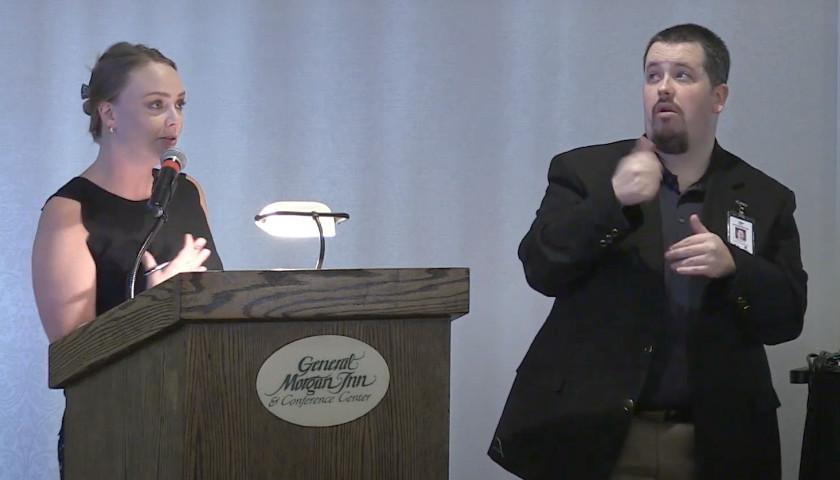The Tennessee Department of Education (TDOE) hosted the first two of ten promised town halls last week designed to gather feedback on A – F letter grades for individual schools.
The TDOE staged initial meetings at the Dixon County High School and the General Motor Inn in Greenville. Neither session drew more than a handful of people. Those in attendance expressed confusion over the purpose of the town halls.
Steve Starn, superintendent of Greenville Schools, summed up the confusion, telling the TDOE that a law passed in 2016 required them to identify and formulate an A – F school grading system before the 2017/2018 school year. The legislation further called for the release of calculated school grades to the public starting that same school year.
“The law is currently written. The results are already in. The method for calculating results is already in place. That method has been communicated to us. That is what we should be judged on,” said Starnes. “Our results are already in from last year, to go back and change the way these results are interpreted…I don’t know if I want to use a word as strong as immoral…but it ain’t right.”
Tennessee created its letter system simultaneously with the federal implementation of the Every Student Succeeds Act (ESSEA). Under ESSA, states are required to develop a plan for the differentiation of their low-performing schools.
The federal policy gives states leeway in deciding what to measure and how much weight to give each measurement. There is no requirement that states assign any rating to all schools, just those needing assistance. States were free to use their own categories or use the same as ESSA required – comprehensive support and improvement, targeted support and improvement, and other schools.
Instead of creating two accountability systems, Tennessee chose to tie the two together, using the same formula to calculate both requirements. Tennessee’s accountability received strong marks for its use of an A-F grading system and because academic growth would constitute 80 percent of schools’ annual ratings—35 percent growth for all students and 45 percent growth to proficiency.
While growth measurement has always been the preference of educators, lawmakers and advocacy groups have often argued for achievement. According to sources that wish to go unnamed, new Tennessee Education Commissioner Lizzette Gonzalez Reynolds falls into the latter group. She recently told state superintendents that the idea that any school can score an “A” while holding a proficiency rate of 14 percent is unacceptable. Reynolds further communicated that the department is in the process of changing the A – F grading criteria.
The potential for a low-achieving school to achieve a high grade was acknowledged upon implementing Tennessee’s grading system.
Then TDOE’s executive director of accountability, Mary Batiwalla, said in the aftermath of the passage of state legislation, “The lowest-achieving school could receive an ‘A’ under our [proposed] system — very low-achieving, but showing what we consider to be remarkable and life-changing growth.”
She added, “It’s a tough conversation to have with folks because there is this very accepted notion that ‘If you say that school that is very low-performing is an A school, you are lying to parents.’”
The Tennessee Star contacted Batiwalla to confirm she still held the same beliefs.
She said she did and added, “If you believe labeling a school as failing will make it better, you have to state the ‘how.’ Are we okay with teachers failing students and calling it a day? Of course not. We expect teachers to provide support. What evidence-based support does the state plan to provide to schools? How do they believe the changes they want will make schools better? And what evidence exists to support their beliefs?”
House Education Administration Chairman State Representative Mark White (R-Memphis) sees the grading system in a broader sense, “A-F letter grades provide a straightforward mechanism for differentiating the performance of Tennessee’s public schools, serving as a valuable tool for all stakeholders. This is especially important for parents, helping them make the important choice of where to send their children to school.”
At the Greenville meeting, Starn explained that Tennessee’s school grading system already includes additional measurements of achievement through its use of Annual Measurable Objectives (AMO). Under the current system, school score additional points if they reach their AMO. Starn described these AMOs as being based “purely on achievement”.
The TDOE will release school grades in November. However, TDOE chief of staff Chelsea Crawford did not provide insight into how citizen feedback will be incorporated into the current school grading policy prior to release.
Reynolds was not present at either town hall. Reynolds previously worked for ExcelInEd, an education policy non-profit founded by former Florida Governor Jeb Bush. The non-profit has long been a proponent of an A – F grading system for schools.
Batiwalla, the former deputy superintendent, shares the suspicions of state superintendents, “The TDOE claims they want to ‘co-create’ a school grading model. That takes trust and transparency. The first two town halls lacked both. During one town hall, the state rep thanked the audience for the discussion. I challenge anyone to watch that video and tell me how that was a discussion.”
She said, “I encourage the state to listen and engage with Tennesseans. When I listen, I hear overwhelming support for an improvement and growth-based model.”
Town halls are scheduled this week at the following times and places:
- Wednesday, August 23: Southwest Region
- Location: Southwest TN Community College Macon Cove Campus (5983 Macon Cove, Memphis, TN 38134)
- Time: 5:30- 7 p.m. CT
- Access Microsoft Teams Livestream
- Facebook Event
- Thursday, August 24: Northwest Region
- Location: Dyersburg Middle School, (400 Frank Maynard Blvd., Dyersburg, TN 38024)
- Time: 5:30- 7 p.m. CT
- Access Microsoft Teams Livestream
- Facebook Event
– – –
TC Weber is a reporter at The Tennessee Star and The Star News Network. He also writes the blog Dad Gone Wild. Follow TC on Twitter. Email tips to [email protected]. He’s the proud parent of two public school children and the spouse of a public school teacher.






Schools should be graded as should students and teachers. Either group should receive remedial work to bring their performance up to standard. Students should not be subjected to inferior teachers nor should teachers wallow in under performing schools. There should be no such thing as “social progression” for any student to a grade for which they are ill prepared. Under performing schools indicate a change is needed in their school administration from the school board on down. Under performing teachers should be dismissed without appeal. If they are incapable of doing the job for which they were hired then they should be terminated.